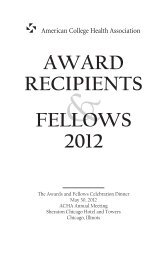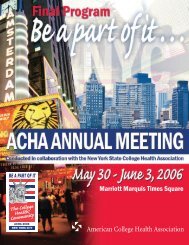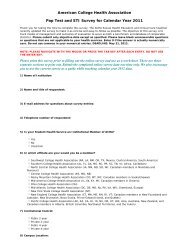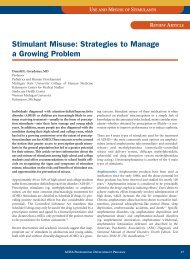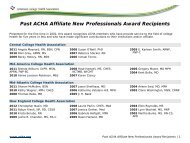final program 2005.qxp - American College Health Association
final program 2005.qxp - American College Health Association
final program 2005.qxp - American College Health Association
Create successful ePaper yourself
Turn your PDF publications into a flip-book with our unique Google optimized e-Paper software.
Wednesday, June 1, 2005<br />
Schedule of Programs and Events<br />
<br />
1:45 PM - 3:15 PM (cont.) 13 WE234. HIPAA is Not Just Privacy<br />
and Security<br />
11 WE228. Cholesterol Levels in a<br />
<strong>College</strong>-aged Population: Research<br />
Review, Recent Findings, and Public<br />
<strong>Health</strong> Communication Addressing<br />
Coronary Vascular Disease Risk<br />
Reduction<br />
CME: 1.5 CH: 1.8 CECH: 1.5 PsyCE: 0<br />
AAFP-P: 1.5 PhCE: 1.5 contact hours (<strong>program</strong> no. 067-<br />
999-05-018-L04)<br />
Room: Pacific Salon 2<br />
The attendee should be able to:<br />
1. Discuss the current literature on<br />
cholesterol levels among 18-25 year<br />
old college students.<br />
2. Describe the need for CHD primary<br />
prevention education through replication<br />
of this model.<br />
3. Explain health education efforts in<br />
terms of the Stages of Change model.<br />
Presenters: Kristina G. Gorbatenko-Roth, PhD, MA,<br />
LP, Lynn M. Murel, MD, and Wendy S. Knutson, MS<br />
(University of Wisconsin-Stout)<br />
Facilitator: Sharon Roberson (University of Texas-<br />
Austin)<br />
12 WE232. Athletic <strong>Health</strong> Care:<br />
What is Going on in Your Athletic<br />
Department<br />
CME: 1.5 CH: 1.8 CECH: 0 PsyCE: 0<br />
AAFP-P: 1.5 PhCE: 0<br />
Room: Royal Palm 3 & 4<br />
The attendee should be able to:<br />
1. Explain the professional education and<br />
board certification of athletic trainers.<br />
2. Identify how student health center professionals<br />
and the athletic trainers from<br />
an athletic department can work<br />
together successfully.<br />
3. Describe various working arrangements<br />
between student health centers and<br />
athletic trainers.<br />
Presenter: Lori Lynn Dewald, EdD,ATC, CHES<br />
(University of Minnesota-Duluth)<br />
Presider: Scott Spear, MD (University of Wisconsin-<br />
Madison)<br />
Facilitator:Yvonne Mark, MD (Johns Hopkins<br />
University)<br />
SCHEDULE OF PROGRAMS AND EVENTS<br />
CME: 1.5 CH: 1.8 CECH: 1.5 PsyCE: 1.5<br />
AAFP-P: 1.5 PhCE: 0<br />
Room: Windsor<br />
The attendee should be able to:<br />
1. Discuss HIPAA implementation in<br />
college health.<br />
2. Demonstrate via case examples the<br />
eleven parts of HIPAA.<br />
3. Discuss the HIPAA timeline.<br />
Presenter: Joan M. Kiel, MPA, MPhil, PhD<br />
(Duquesne University)<br />
Presider: Kim Henson, MPA (University of New<br />
Mexico)<br />
Facilitator: Carol Bennett Seager, MSA (University<br />
of Kansas)<br />
14 WE262. Continuing Education<br />
Workshop for Program Planners and<br />
Presenters<br />
CME: 1.5 CH: 1.8 CECH: 1.5 PsyCE: 1.5<br />
AAFP-P: 0 PhCE: 0<br />
Room: Sunset<br />
The attendee should be able to:<br />
1. Describe characteristics of rigorous<br />
college health professional development<br />
<strong>program</strong>ming.<br />
2. Contrast “interesting” <strong>program</strong>s with<br />
those worthy of continuing education.<br />
3. List steps to coordinating the planning<br />
and implementation of a college health<br />
professional development <strong>program</strong>.<br />
Presenter: Eleanor W. Davidson, MD (Case<br />
Western Reserve University), Kathy MacLachlan,<br />
MS, RN-C,ANP (Syracuse University), Ric Underhile,<br />
PhD, LLPC, CHES (Outside the Classroom), Mike<br />
Malmon-Berg, PhD (<strong>College</strong> of Wooster)<br />
Presider: Eleanor W. Davidson, MD (Case Western<br />
Reserve University)<br />
Facilitator: Kathy MacLachlan, MS, RN-C,ANP<br />
(Syracuse University)<br />
15 WE275. Treating the Multiple<br />
Disordered, Chronically Suicidal Patient:<br />
Dialectical Behavior Therapy for<br />
Borderline Personality Disorder<br />
CME: 1.5 CH: 1.8 CECH: 0 PsyCE: 1.5<br />
AAFP-P: 1.5 PhCE: 0<br />
Room: Royal Palm 1 & 2<br />
The attendee should be able to:<br />
1. Define borderline personality disorder.<br />
2. Describe the current status of<br />
Dialectical Behavior Therapy (DBT)<br />
treatment outcome research.<br />
Page 32<br />
3. Explain the DBT theory of borderline<br />
personality disorder.<br />
4. Describe DBT treatment strategies.<br />
Presenter: Milton Brown, PhD (Alliant University)<br />
Presider: Gail Pakalns, PhD (Seton Hall University)<br />
Facilitator: Joetta L. Carr, PhD (Western Michigan<br />
University)<br />
16 WE283. Student Poster Session<br />
CME: 1.5 CH: 1.8 CECH: 1.5 PsyCE: 0<br />
AAFP-P: 0 PhCE: 0<br />
Room: California<br />
The attendee should be able to:<br />
1. Describe the conclusion of one<br />
research poster presented by a student<br />
presenter.<br />
2. Discuss one policy implemented by<br />
a student health advisory committee,<br />
which was presented by a student<br />
presenter.<br />
3. Describe one <strong>program</strong> initiative coordinated<br />
by peer health educators and<br />
presented by a student presenter.<br />
Presenter: Mary Tschann (University of San<br />
Francisco)<br />
Presider: Mary Tschann (University of San<br />
Francisco)<br />
Facilitator: Danielle Fods (University of Minnesota-<br />
Minneapolis)<br />
3:45 PM - 5:15 PM<br />
17 WE025. Vanderbilt University’s<br />
Transition to Electronic Medical<br />
Records: Our Experience of Planning,<br />
Implementing, and Using EMRs<br />
CME: 1.5 CH: 1.8 CECH: 1.5 PsyCE: 1.5<br />
AAFP-P: 1.5 PhCE: 1.5 contact hours (<strong>program</strong> no. 067-<br />
999-05-019-L04)<br />
Room: Golden Ballroom<br />
The attendee should be able to:<br />
1. List technology, software, and patient<br />
room upgrades and costs that need to<br />
be considered before EMR implementation.<br />
2. Describe ways in which staff can be<br />
trained and brought on board to cope<br />
with a large transition and change to<br />
almost all patient communication being<br />
electronic.<br />
3. Identify factors that may be of relevance<br />
to your own clinic when deciding<br />
if an EMR system is right for you.<br />
Presenters: Jennifer Ann Swails-Wenger, MS, and<br />
K. Louise Hanson, MD (Vanderbilt University)<br />
Facilitator: Sharon Roberson (University of Texas-<br />
Austin)


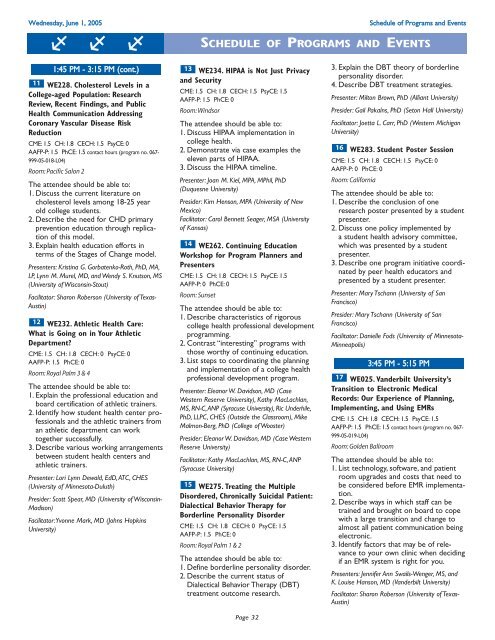
![Final Program [5.4MB pdf] - American College Health Association](https://img.yumpu.com/49022356/1/190x245/final-program-54mb-pdf-american-college-health-association.jpg?quality=85)




